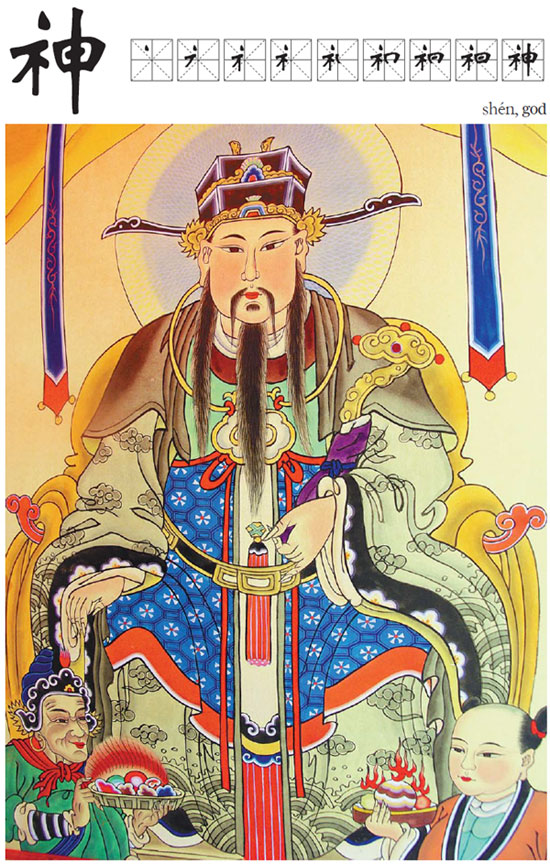The evolution of god

The Chinese character for deity evolved from thunder and lightning from the heavens
The notion of a thunder god is a familiar figure in popular culture - actor Chris Hemsworth, People magazine's sexiest man alive of 2014, wielding the sacred hammer mjolnir to defend New York and London against alien invasions in recent Marvel blockbusters, comes to mind. The Norse god represents a well-known cultural trope, but it is perhaps less well-known that the ancient Chinese had a similar way of looking at their deities, so much so that the earliest Chinese character for "god" comes in the form of lightning.
It occurred during the Shang Dynasty (16th century-11th century BC) when the concept of god was written down as a swirl of lightning on oracle bones. The modern equivalent of the pictogram is 申 (shēn). Later, the radical 示 (shì), indicating worship, was added to the left side. 示 was also a pictogram in the form of an altar on which the sacrifice was presented. With that, the character is complete: 神 (shén), the mysterious, all-powerful deity.
According to Chinese folk religion, everything is governed by a god: the god of wind 风神 (fēngshén); the god of thunder 雷神 (léishén); and the god of sun 太阳神 (tàiyáng shén). Those are just some of the gods of the sky. When you look down to the Earth, there are the mountain gods 山神 (shānshén); the sea gods 海神 (hǎishén); and the river gods 河神 (héshén). Even in the modest household of the common man, there's the door god 门神 (ménshén) and stove god 灶神 (zàoshén), whose duties are to ward off evil and to record the deeds of the family. Of course, practical as the Chinese people are, their most worshiped deity is probably the god of wealth 财神 (cáishén). He is often represented as a gentleman with a red silk robe with golden embroidery who smiles and holds a jade scepter in his right hand, a traditional ingot of gold in the left. The god of wealth can be found anywhere there's business to be done.
神 can also be used to describe genius and great talent. In the past, people used to refer to a doctor with great medical skills as 神医 (shényī), a particularly smart kid is called 神童 (shéntóng), and a crack shot is 神枪手 (shénqiāngshǒu). 神 goes on to mean "magical and amazing" and forms a series of words and phrases. For instance, 神通广大 (shén tōng guǎng dà) means "be infinitely resourceful", as in 他打探起小道消息来,真是神通广大 (tā dǎtàn qǐ xiǎodào xiāoxi lái, zhēnshi shén tōng guǎng dà), meaning, "He is infinitely resourceful at digging up gossip". 神乎其神 (shén hū qí shén) means "miraculous" but not without a satirical tone.
神 and 鬼 (guǐ, ghost) often go hand in hand to mean superpowers or the supernatural. 鬼使神差 (guǐ shǐ shén chāi), literally "manipulated by ghosts and gods", is used to describe surprising coincidences, unexpected events, or having done something inexplicable.
Another phrase, 鬼斧神工 (guǐ fǔ shén gōng) literally means "ghosts' axes with god's technique" and is used to describe uncanny workmanship. The phrase 神出鬼没 (shén chū guǐ mò), literally "to appear like a god and disappear like a ghost", is often used to describe mysterious goings on. If something is conducted in secrecy, we use the phrase 神不知,鬼不觉 (shén bù zhī, guǐ bù jué), literally "unknown to god or ghost".
Chinese culture has never really been heavily religious, especially with the influence of Confucianism. Confucius told people "to respect ghosts and gods but also keep your distance" (敬鬼神而远之 jìng guǐ shén ér yuǎn zhī). In addition, there are a series of god/ghost combinations with negative connotations, such as 牛鬼蛇神 (niú guǐ shé shén), literally "ox ghosts and snake gods", which means "wicked people of all descriptions". Perhaps because the human mind is equally mysterious and elusive, 神 is also associated with mental and intellectual themes. For instance, 神智 (shénzhì) means "mind and intellect", while 神经 (shénjīng) is "nerve". From divine power to the complex human mind, 神 encompasses a wide range of subjects, all of which started with thunder and lightning from the heavens.
Courtesy of The World of Chinese, www.theworldofchinese.com
The World of Chinese
| A traditional painting of the god of wealth. Provided to China Daily |
(China Daily Africa Weekly 02/20/2015 page27)
Today's Top News
- Xi sends regards to renowned actor who joins CPC at 92
- China urges cooperation as US lifts trade restrictions
- China, US confirm details to implement leaders' consensus
- Will artificial intelligence outsmart humankind?
- 'One-hour living circle' invigorates GBA
- Nation well-positioned to meet 2025 growth target































